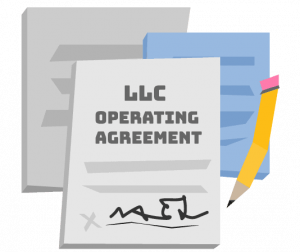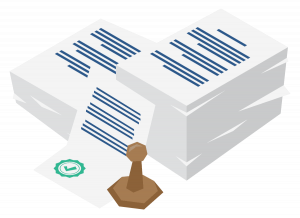Start a Business in Delaware
Starting a business in Delaware is easy. All you need to do is file a few forms with the Delaware Secretary of State and start running your business. Below, we show you how to get started and walk you through some of your options.
One option is, of course, to stop reading and just hire us to start your business for you. At Northwest, we form businesses and provide registered agent service throughout the US. That’s our business, and obviously we recommend starting your business in a certain way. We call it “Starting a Business the Right Way."
When You Want More
$39 + State Fees
When we form your company, you get everything you need to start your business from scratch.
- Business Entity Formation
- Business Phone Service and Email Address
- Website and Web Hosting
- SSL Security
- Domain Name
- Privacy by Default®


1. Pick a Business Structure
The easiest business entity to form is a sole proprietorship—all you have to do is sell something. Selling hand-crafted pottery online? You’re a sole proprietor. Selling it with a friend? You have a general partnership. In either case, your personal finances are the same as your business finances. This means that if anyone sues your business or if your business goes into debt, your personal assets—house, car, savings—are all vulnerable.
To avoid mixing personal and business finances, you’ll have to form your business as a separate entity. As such, your business is financially independent and carries its own liability. The most common business entities are LLCs and corporations.
Delaware Limited Liability Company (LLC)
An LLC will give you options when it comes to structuring your business. While you can choose to run day-to-day operations yourself, you can also choose to hire managers. An LLC can also elect to change its default tax status. To start a Delaware LLC, you’ll have to file formation papers with the Delaware Division of Corporations.
Delaware Corporation
Corporations must follow strict rules when it comes to record-keeping and management structure. For example, all corporations are made up of officers (think CEO, CFO, etc.), and these officers are appointed by board members, who themselves are elected by shareholders. These layers of accountability can be attractive to investors and donors. To form a Delaware corporation, you’ll need to file paperwork with the Delaware Division of Corporations.
Delaware Single-Member LLC
A one-person LLC is called a single-member LLC. Single-member LLCs are one of the most common kinds of businesses in the country. For the most part, single-member LLCs are just like multi-member LLCs, but there are some slight differences in how they file taxes and protect personal assets.
Read all about Single-Member LLCs.
Delaware Nonprofit
If your organization will serve a particular community or benefit the public in some way, you may qualify as Delaware nonprofit corporation. To form a nonprofit in Delaware, you’ll have to file a nonprofit Certificate of Incorporation with the Delaware Division of Corporations.
Want to learn more? Check out our Nonprofit Guide.

2. Name Your Business
Naming a business takes more than creativity—you’ll also have to follow Delaware’s business name requirements. If you’re a sole proprietor, for example, your business name will be the same as your own first and last name (Michael Li)—unless you register a DBA name for your business (Michael’s Coffee Shop).
LLCs and corporations have to follow even more specific rules. The name of your LLC or corporation must:
- Use the correct entity identifier, like “LLC” for a limited liability company or “Inc.” for a corporation.
- Be distinguishable from other business names registered in Delaware.
- Not use words, acronyms or phrases that describe government agencies, like “ambulance” or “FBI.”
- Not use words that falsely indicate a business purpose like “charity” or “nonprofit” (unless you’re forming a charity or nonprofit).
- Not use words that describe a service requiring a professional license, like “dentist” or “nurse.”
Reserving your business name may be helpful if you’re dead-set on a particular name, but you’re not yet ready to file paperwork with the state. To do this, file a Name Reservation Application ($75) with the Delaware Division of Corporations. This will put a specific business name on hold for you for up to 120 days. You can even file a Name Re-Reservation Application to extend for another 120 days, should you need to.
It’s a good idea to check with the US Patent and Trademark Office (USPTO) to make sure your business name hasn’t been trademarked by someone else. If it has, and you use it anyway, there’s a chance that the business could come after you for infringement.
Find out if your desired name is available in Delaware by searching the Delaware Business Database.
Delaware DBA
A DBA is like a nickname for your business. You can use it on signs, websites and other materials related to business operations—but it’s not your legal name.
Your business’s legal name is the one listed on your LLC’s or corporation’s formation documents. Or, if you’re a sole proprietor, your business name is your own legal name. The only way to use a different name for business is if you register a DBA.
Delaware refers to DBAs as “fictitious names” or “trade names.” To get a trade name, you’ll have to file Delaware’s Registration of Trade, Business & Fictitious Name Certificate with your county clerk’s office. If you do business in New Castle, Kent and Sussex counties, you’ll have to file a DBA in each one.

3. File Formation Paperwork
Sole proprietors and general partnerships don’t need to file formation paperwork with the state because neither business type is an independent entity. However, both sole proprietors and general partnerships need to obtain a general business license to legally operate in Delaware.
LLCs and corporations, on the other hand, need to file formation paperwork. Filing formation documents with the Delaware Division of Corporations is what makes these business entities official.
- To start a Delaware LLC, file Delaware Articles of Organization.
- To form a Delaware corporation, file Delaware Articles of Incorporation.
In addition to providing information about your LLC or corporation, you’ll need to include the name and address of a Delaware registered agent (someone to handle legal notices on behalf of your business). You can send the completed form to the Delaware Division of Corporations online, by mail, or in person.
Note: As one of the more business friendly states, Delaware formation documents require minimal information. You’ll also be asked to provide a cover letter with the name, address, phone number and email address of your “submitter,” but this will not become part of the public record.
How can I keep my information off the public record?
Delaware makes it easy for businesses to maintain privacy. LLC filings won’t include any personal information, and corporate filings only ask for the name and address of an “incorporator.” If you hire a registered agent service, like Northwest, you can use our name instead of your own!
What is a registered agent?
Your Delaware registered agent is the person or entity who receives legal notices—like lawsuits or court summons—on behalf of your business. Legally, a registered agent must be available during regular business hours and be able to deliver these important documents (known as “service of process”) to your business in a timely manner. While you can be your own registered agent, you can only do so if you sit in an office all day. (Impossible if you run a delivery service or do just about anything else that requires you to be elsewhere.) For this reason, hiring a reliable registered agent service can be a big help.

4. Draft Internal Records
So far in this guide, we’ve dealt with public forms that you’ve had to file with the Delaware Division of Corporations. Now, it’s time to organize your internal records. These are the documents your business will keep on record within your company.
Though these documents are internal, you’ll likely need to show them to third parties like the bank or—if you start a nonprofit—the IRS.
Here are the major internal documents you need to organize for LLCs and corporations:
Delaware LLC Operating Agreement
This is your LLC’s rule book. It defines how your LLC will do things like make decisions, distribute money, manage operations, and appoint officers. Your operating agreement plans for every big picture scenario your LLC is likely (or unlikely) to face, including dissolution.
Drafting an operating agreement is hard, and the internet is full of shabby templates that have been copy and pasted from who knows where. So we had our attorneys draft a Delaware LLC operating agreement template that you can use as a solid foundation.
Delaware Corporate Bylaws
Bylaws are the rules your corporation will adopt and follow internally. Bylaws detail how your corporation will appoint directors and officers, hold shareholder and board meetings, and handle emergencies, among other things. Unlike operating agreements, corporate bylaws are required by law in Delaware (see 8 DE Code § 109).
As with operating agreements, you can find plenty of bylaws templates online. But bylaws are pretty serious, so you don’t want to just use the first template you come across. Our attorneys drafted a Delaware Corporate Bylaws template you can use to get started.
Starting a nonprofit? Learn about Delaware Nonprofit Bylaws.

5. Get Delaware Business Licenses
All businesses in Delaware need a business license—even sole proprietors. Depending on the scope of your business, you may need additional licenses, too.
Delaware State Business License
If you conduct business in Delaware, you must apply for a business license with the Delaware Division of Revenue. This is how the state keeps track of businesses for state tax purposes.
You can easily obtain a state business license through Delaware One Stop, the state’s licensing portal. The application process will require basic information (like your business name, entity type, address)—and must be completed online. The cost of a Delaware state business license will vary, depending on the business. However, a business with one location will generally spend $75 for a state license.
Professional Business Licenses
You’ll need a professional license if you offer a service in a regulated profession, like medicine, law or engineering. (For a full list of professional services, see 8 DE Code Chapter 6.) To get a license in your profession, you’ll probably have to go through specialized training or education. Once you do—and if you pass—you can apply for a license through the state board that regulates your profession. The application process may look different for each profession.
Professional licenses are issued by state licensing boards, like the Delaware Board of Architects or the Delaware Board of Accountancy. To get a professional license from the state board that regulates your profession, you’ll have to follow the procedures dictated by that board. Each board is usually made up of professionals and members of the public appointed by Delaware’s governor.
Local Business Licenses
Whether or not you need a local business license will depend on the type of business you operate, as well as where it’s located. For example, if you own a building, you’ll need to reach out to your county office (either in Kent, New Castle, or Sussex) for information on building and/or zoning permits. And if you plan to work on any sewage lines in Sussex County, specifically, you’ll need a Plumber License.
Municipal licenses and/or permits can be issued at the county, city or town level, and requirements vary by municipality. To find out what’s required for your business, it’s best to reach out to each municipality directly.
The requirements for local business licenses and/or permits vary by location. For example, the town of Bethany Beach requires all businesses—including home businesses—to apply for a general business license. But the village of Arden has no business license requirements. It’s best to check the government office in your municipality to find out what types of licenses and/or permits you might need.
Learn more about How to Get a Business License.

6. Organize Your Money
The liability protection you get from forming an LLC or corporation is only as strong as the separation between you and your business. At a minimum, you’ll need to open a bank account for your business. And if you’re going to hire employees, you’ll need to tackle payroll, too.
Open a Business Bank Account
To keep your business spending separate from your personal spending, you’ll need to open a business bank account. If you don’t, a court could find that your business is not actually separate from you, the owner, under the Alter Ego Doctrine. Also known as piercing the corporate veil, this is the outcome when a judge finds that a company is not a separate entity but rather an alter ego of the owner. If this ever happens, you could lose your limited liability status.
LLCs and corporations will need to provide the bank with their formation documents, operating agreement or corporate bylaws, EIN, and in some cases, a Corporate Resolution to Open a Bank Account or LLC Resolution to Open a Bank Account. Opening a business bank account as a sole proprietor is important, too. Though sole proprietors and general partnerships have no limited liability status to protect, both will benefit from organizing their business finances come tax season.
Set up Payroll
Setting up payroll will be a necessary step for your business if you’re planning to hire employees or independent contractors. Your new employees will need to fill out a W-4 to determine how much you’ll withhold and an I-9 to verify that the employee is eligible to work in the US. To do so, you’ll need to:
- apply for an EIN
- get a Delaware Business Entity File Number
- find your Employer Unemployment Insurance (UI) Contribution Rate
- determine whether you’ll hire employees or independent contractors
- prepare payroll forms for your hirees to complete
- select a payroll service or software
- decide on a payroll schedule
You can decide to run payroll yourself, but then you’ll be solely responsible for calculating withholding taxes and getting payments out on time. A payroll service or software system will do both automatically, in addition to filing state and federal returns on your behalf. Either option will also issue payments using direct deposit or old-fashioned check—whatever you prefer. (Though Delaware encourages direct deposit for all businesses, the state can’t legally enforce it.)
Independent Contractor vs Employee
It’s important to understand the difference between an independent contractor and an employee. That’s because for employees, you’ll need to withhold and pay income, social security, and Medicare taxes. Independent contractors pay these taxes on their own.
An independent contractor is self-employed—how they complete their work is not directly controlled by an employer. An independent contractor may perform the same kind of work for other businesses, and can do the work when and how they choose.
An employee, on the other hand, performs their work how and when their employer chooses.
If you’re unsure, you can file Form SS-8 with the IRS and let them decide.
Learn everything you need to know about hiring independent contractors.
Payment Processing for Small Businesses
Payment processors require you to provide them with a bank account. This is where they’ll deposit funds from transactions. Most of the time, this needs to be a business bank account.
Some payment processors may let you get away with listing a personal bank account, but it’s not a great idea. Mixing your business finances with your personal finances erodes the separation between you and your business, weakening your liability protection. It also turns tax season into a nightmare.
Learn more about Payment Processing.
Delaware Business Entity File Number
You’ll receive your Business Entity File Number when you register your business through the Delaware Corporations Information System (DCIS), known as eCorp. When you register, you’ll also receive your business’s Employer Unemployment Insurance (UI) Contribution rate, which you’ll need to set up payroll.

7. Get Business Insurance
Forming an LLC or corporation protects your personal assets. But if anything disastrous befalls your business—like a lawsuit, burglary, flood, or fire—your business is on the hook to pay. Business insurance can help cover the costs.
That said, whether or not you need business insurance is another story. Delaware requires businesses to obtain some forms of insurance, but not others. As for those others? It’s a gamble. Whether or not you choose to buy comprehensive insurance for your business depends, in large part, on the level of risk you’re willing to take.
Here’s a breakdown of the most commonly purchased business insurance:
Workers’ Compensation Insurance
Delaware requires pretty much all businesses with one or more employees to pay for workers’ compensation insurance. The only exceptions to this rule are domestic workers and farm workers, though their employers may provide coverage if they choose to do so. All other businesses must purchase workers’ compensation insurance from a private insurance company, or—if coverage is difficult to secure for your business—you can contact the Delaware Compensation Rating Bureau to apply for coverage through the Delaware Insurance Plan (DIP). Businesses that don’t provide workers compensation benefits for their employees (but are required to do so), will be subject to fines between $500 and $2,500.
Delaware workers’ compensation laws apply to both employees and employers. However, as many as eight corporate officers or four LLC members may choose to be exempted from coverage, so long as there is a written agreement between the business and the individual(s) forgoing coverage.
Liability Insurance
This covers the costs of claims against your business for injuries or damages to the property of others, like clients or customers. This includes medical expenses, legal fees, settlements, and judgments. Whether or not you need it depends on whether your business is likely to be sued and how many assets your business needs to protect. If it’s just you and your computer in your basement, you might feel comfortable skipping liability insurance. Or maybe you won’t. Beyond general liability insurance, you can purchase or add on more specific types, like professional, cyber, commercial, home-based business, or product liability insurance.
Do I need business insurance for my home-based business?
Probably. That’s because you can’t count on your homeowners’ or renters’ insurance policy to cover damages related to your business. Most insurance companies offer a home-based business insurance plan.

8. Understand Your Tax Burden
Not only does Delaware respect business owners’ privacy, it doesn’t enforce state or local sales tax—this makes Delaware a very favorable place to do business. However, this doesn’t mean you won’t have to pay ANY taxes. There are other state and local taxes to consider, not to mention federal taxes.
Federal Taxes
- LLCs. Single-member LLC? By default, you’re taxed similar to a sole proprietor. More than one LLC owner? You’re taxed as a general partnership. Either way, your default tax status is “pass-through,” which means you don’t pay corporate taxes. Instead, your LLC’s owners report profits and losses on their personal tax returns. An LLC can file paperwork with the IRS to be taxed as an S-Corp or C-Corp instead.
- Corporations. Corporations are taxed as C-Corps by default. This means that corporations pay the 21% federal corporate tax rate and the applicable Delaware corporate tax rate.
To pay your federal taxes (and take a good deal of other steps required to start a business), you’ll need to get an Employer Identification Number (EIN). You can apply for one with the IRS or hire us to get one for you. To get an EIN, you can either apply online or file form SS-4 by mail with the IRS. Getting an EIN is free.
Check out our guide to applying for an EIN.
Local Delaware Business Taxes
Unlike most states, Delaware does not impose a local sales tax in any municipality. In lieu of paying sales tax, businesses are required to obtain business licenses at the state level, as well as in some local jurisdictions (such as Dover, Newark and New Castle, to name a few). The City of Wilmington—Delaware’s largest—even requires an Earned Income Tax (or City Wage Tax), which is basically a tax for living and/or working in the city. In short: you should contact your local municipality to find out whether you’ll have any local tax obligations.
S-Corp
An S-Corporation is a federal tax election. Registered business entities like LLCs and corporations start out with a default tax status, but can file paperwork with the IRS to be taxed as an S-Corp. Like LLCs, S-Corps are taxed as pass-through entities. Like corporations, S-Corps can make distributions that aren’t subject to the 15.3% self-employment tax.
Learn more about the S-Corp tax election.
C-Corp
A C-corporation is the default federal tax election assigned to corporations. Most corporations are taxed as C-Corps, but LLCs can also apply for C-Corp tax designation by filing paperwork with the IRS. C-corps file federal corporate income taxes and state corporate income taxes (in Delaware, the corporate tax rate is 8.7%). C-corps can pay their shareholders in distributions, and the shareholders report those profits on their personal tax returns.
Learn more about the C-Corp tax election.
Do I need an EIN if I’m self-employed?
If you’re operating a sole proprietorship or single-member LLC that doesn’t employ anyone else and you don’t need to file excise or pension plan returns, you don’t legally need an EIN.
However, you can still get one—and you probably should. Otherwise, you’ll have to use your own social security number to do business. Plus, you’ll likely need an EIN to open a business bank account.

9. Build Your Business Website
If you want people to find your business, they have to be able to find you online. This means you’ll need a website, a business email account, and social media accounts. Don’t worry if you’re not especially tech-savvy—you don’t have to be a web developer or an influencer to establish a robust online presence. You’ll just need the following:
- Domain name. Your domain is the address where your website will live. You’ll want a domain name that is short, unique, local, and—most importantly—available. If your domain is trademarked, you could face legal trouble.
- Domain registrar. Once you’ve decided on a domain name, you’ll want to register it with a domain registrar. Some domains are more expensive than others. Some domain registrars also offer hosting and most will provide you with a business email that includes your domain name (“name@yourbusiness.com”).
- SSL certificate. An SSL certificate signals to your users that your website is secure. If your website will use forms—like a sign-up form or a “contact us” form—an SSL certificate is critical. But even if you don’t you use forms, you’ll still probably want one—it allows an encrypted connection, which means your users’ data is transported securely. There are several types of SSL certificates, and you can often get one through your domain registrar.
- Site design. The easiest option is to use a free website creation tool—there are a number of free options available. Most are easy even for a newcomer to use, with styles and built in templates. For a more custom design, you can hire a web designer to work on your website, but this will be much more expensive.

10. File DE Annual Report / Franchise Tax
Delaware corporations are required to file an annual report and pay franchise tax. (Foreign corporations, however, need only file an annual report.) LLCs have to pay an annual tax of $300. You read that right: no annual reports for Delaware LLCs, but a pretty hefty annual tax.
For domestic Delaware corporations, the annual report is pretty simple. It only requires you to provide and/or update basic information about your business, like your address and director/officer information. You will also provide franchise tax information in your annual report.
All state tax-related filings (annual report, franchise tax, annual tax) must be made online, through the Delaware Corporations Information System (DCIS – eCorp). Domestic corporations must complete their filings by March 1, foreign corporations by June 30, and all LLCs by June 1.
You could rack up hefty debt for failing to file annual reports and fees with the Delaware Division of Corporations. If you miss the deadline for your annual report and tax fees, you’ll be facing a fine of $200 plus 1.5% interest per month. This applies to all business entities.
Read more about How to File a Delaware Annual Report.

11. Apply for Trademarks
A trademark is a design, symbol, word, phrase—or any combination thereof—that represents a brand’s goods or services exclusively. Only some businesses register trademarks.
You can apply to register your trademark with the State of Delaware or federally with the U.S. Patent and Trademark Office (USPTO). Registering your trademark in Delaware is cheaper and easier than registering with the USPTO, but doing so only protects your trademark in Delaware.
Registering a trademark in Delaware will require you to submit an Application for Registration of Trademark or Service Mark to the Delaware Division of Corporations ($35). You’ll have to attach TWO copies (or “facsimiles”) of the mark, one of which will be filed with the state, and the other will be returned to you along with your Certificate of Registration.
Note that when you register your trademark with the Delaware Secretary of State, this only protects your trademark in Delaware.
You can only register a trademark once you’ve started using it (so slap it on that website you just made), and not all applications are approved. Trademark law is complex, and the strength of a trademark application (and the trademark itself) depends on many factors.
Our attorneys can review your application, offer advice, and prepare and submit the application for you—check out our Trademark Service.
Can I register a trademark before I use it?
No. But you can file an application with the USPTO under Intent-to-Use status. This gets your application in line before you’ve actually used the mark, which could be helpful if you’re worried someone else might register your mark before you’ve had a chance to use it.
For your trademark to become official, you’ll eventually need to show proof that you’re using it. An Intent-to-Use application buys you some time to do that.
Learn more about filing an Intent-to-Use Trademark.
Ready to Start Your Delaware Business?







